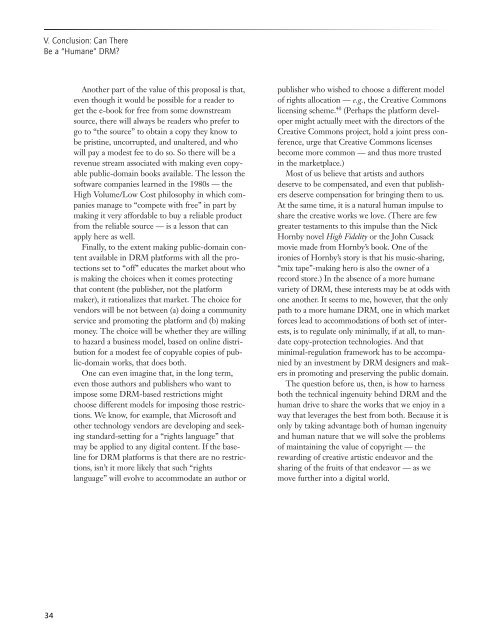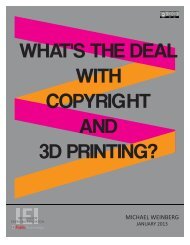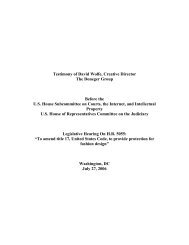What Every Citizen Should Know About DRM, aka - Public Knowledge
What Every Citizen Should Know About DRM, aka - Public Knowledge
What Every Citizen Should Know About DRM, aka - Public Knowledge
Create successful ePaper yourself
Turn your PDF publications into a flip-book with our unique Google optimized e-Paper software.
V. Conclusion: Can ThereBe a “Humane” <strong>DRM</strong>?Another part of the value of this proposal is that,even though it would be possible for a reader toget the e-book for free from some downstreamsource, there will always be readers who prefer togo to “the source” to obtain a copy they know tobe pristine, uncorrupted, and unaltered, and whowill pay a modest fee to do so. So there will be arevenue stream associated with making even copyablepublic-domain books available. The lesson thesoftware companies learned in the 1980s — theHigh Volume/Low Cost philosophy in which companiesmanage to “compete with free” in part bymaking it very affordable to buy a reliable productfrom the reliable source — is a lesson that canapply here as well.Finally, to the extent making public-domain contentavailable in <strong>DRM</strong> platforms with all the protectionsset to “off” educates the market about whois making the choices when it comes protectingthat content (the publisher, not the platformmaker), it rationalizes that market. The choice forvendors will be not between (a) doing a communityservice and promoting the platform and (b) makingmoney. The choice will be whether they are willingto hazard a business model, based on online distributionfor a modest fee of copyable copies of public-domainworks, that does both.One can even imagine that, in the long term,even those authors and publishers who want toimpose some <strong>DRM</strong>-based restrictions mightchoose different models for imposing those restrictions.We know, for example, that Microsoft andother technology vendors are developing and seekingstandard-setting for a “rights language” thatmay be applied to any digital content. If the baselinefor <strong>DRM</strong> platforms is that there are no restrictions,isn’t it more likely that such “rightslanguage” will evolve to accommodate an author orpublisher who wished to choose a different modelof rights allocation — e.g., the Creative Commonslicensing scheme. 40 (Perhaps the platform developermight actually meet with the directors of theCreative Commons project, hold a joint press conference,urge that Creative Commons licensesbecome more common — and thus more trustedin the marketplace.)Most of us believe that artists and authorsdeserve to be compensated, and even that publishersdeserve compensation for bringing them to us.At the same time, it is a natural human impulse toshare the creative works we love. (There are fewgreater testaments to this impulse than the NickHornby novel High Fidelity or the John Cusackmovie made from Hornby’s book. One of theironies of Hornby’s story is that his music-sharing,“mix tape”-making hero is also the owner of arecord store.) In the absence of a more humanevariety of <strong>DRM</strong>, these interests may be at odds withone another. It seems to me, however, that the onlypath to a more humane <strong>DRM</strong>, one in which marketforces lead to accommodations of both set of interests,is to regulate only minimally, if at all, to mandatecopy-protection technologies. And thatminimal-regulation framework has to be accompaniedby an investment by <strong>DRM</strong> designers and makersin promoting and preserving the public domain.The question before us, then, is how to harnessboth the technical ingenuity behind <strong>DRM</strong> and thehuman drive to share the works that we enjoy in away that leverages the best from both. Because it isonly by taking advantage both of human ingenuityand human nature that we will solve the problemsof maintaining the value of copyright — therewarding of creative artistic endeavor and thesharing of the fruits of that endeavor — as wemove further into a digital world.34





